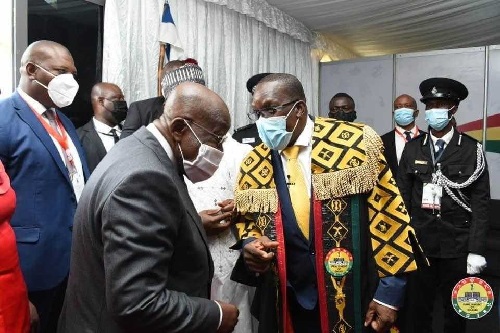
Speaker objects to approval of President’s ministerial nominees
Parliament today [March 20, 2024] stopped short of considering the President’s ministerial nominees prior to adjourning sine die.
The Speaker of Parliament, Alban Sumana Kingsford Bagbin, told the House the inability to consider the nominees followed an interlocutory injunction suit filed by the National Democratic Congress Member of Parliament for South Dayi at the Supreme Court to restrain him.
The restraint, he said, was to stop him as the Speaker of Parliament from proceeding with the vetting and approval of the names of persons submitted by the President until the provisions of the Constitution were satisfied.
He told the House that he received the process from the court tiled “Rockson-Nelson Etse K. Dafeamekpor vrs. The Speaker of Parliament and the Attorney -General (suit no. J1/12/2024).
Advertisement
Addressing the House prior to adjourning sine die today, Mr Bagbin informed the House that court process was served on March 19, 2024.
“The House is unable to continue to consider the nominations of His Excellency the President in the spirit of upholding the rule of law until after the determination of the application for interlocutory injunction by the Supreme Court,” the Speaker said.
Communication to Parliament
On February 14 and 28, 2024, President Nana Addo Dankwa Akufo-Addo, in accordance with articles 71(1) AND 79(1) of the Constitution communicated to Parliament the nomination of persons for appointment as ministers of state and deputy ministers.
They are Abena Osei-Asare as Minister of State-designate for the Ministry of Finance; Dr Benjamin Sekyere Yeboah as Deputy Minister-designate for the Ministry of Gender, Children and Social Protection; Sylvester Tetteh as Deputy Minister-designate for the Ministry of Information.
The others are Charles Acheampong as Deputy Minister-designate for the Ministry of Communication and Digitalisation; Adelaid Ntim as Deputy Minister-designate for the Ministry of Health; Alexander Akwasi Acquah as Deputy Minister -designate for the Ministry of Health; Vincent Ekow Assafuah as Deputy Minister-designate for the Ministry of Local Government.
The rest are John Kobina Abbam Sanie as Deputy Minister-designate for Ministry of Energy; Collins Adomako Mensah as Deput Minister-designate for the Energy Ministry; Dr Prince Hamidu Armah as Deputy Minister-designate for the Ministry of Works and Housing; Prof. Festus Awuah Kwofie as the Deputy Minister-designate for the Ministry of Employment and Labour Relations; Akwasi Konadu as Deputy Minister-designate for the Lands and Natural Resources Ministry and Dr Alexander Ampaabeng as Deputy Minister-designate for the Ministry of Finance.
Two other injunctions
Justifying the decision not to consider the approval of the President’s nominees ahead of the House going on recess, Mr Bagbin said the House had been duly served with two injunction applications in respect of the anti-gay bill.
The applications were titled Richard Sky v the Parliament of Ghana and the Attorney-General, and Dr. Amanda Odoi v the Speaker of Parliament & the Attorney General, he said.
He recalled that on July 19, 2023, the Supreme Court considered and dismissed an application for interlocutory injunction that sought to injunct the proceedings of Parliament in respect of the bill.
The court in that case, Dr. Amanda Odoi v the Speaker of Parliament & the Attorney General (J1/13/2023) reasoned that the application failed to meet the threshold for the grant of interlocutory injunctions.
“The Executive Secretary to the President noted in his letter that ‘it is settled law that during the pendency of an interlocutory injunction application, the status quo ante ought to be preserved, and no action be taken that would result in prejudicing the injunctive relief sought and undermining the authority of the court”.
“An injunction is a judicial order that restrains a person from beginning or continuing an action that threatens or breaches the legal right of another, or that compels a person to carry out a certain act, such as correcting a wrongful state of affairs.
“In the context of our law, interlocutory injunctions serve as an important tool for maintaining the status quo pending the resolution of a legal dispute, ensuring that the parties involved do not engage in actions that could cause irreparable harm or fundamentally alter the situation before the court has an opportunity to decide the case,” he said.
The Speaker indicated that the Executive Secretary to the President's reference to the preservation of the status quo ante during the pendency of an interlocutory injunction application was a highlight of the fundamental principle intended to prevent any action that might prejudice the injunctive relief sought or undermine the authority of the court.
“However, the interpretation of this principle has given rise to two distinct schools of thought regarding the effect of an application for an injunction,” he said.
